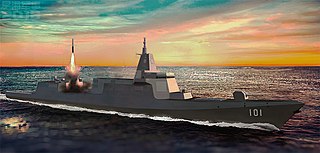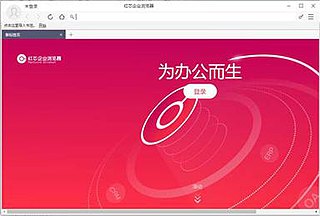Related Research Articles
The FL-7 is the export version of the SY-2 missile, specifically the liquid propellant prototype of SY-2. The export variant of the solid propellant SY-2 is known as the FL-2.
The CY-1 is a Chinese anti-submarine rocket carried on a variety of surface platforms, including the Luda class missile destroyers and Jiangwei class missile frigates. A series of CY ASW missiles have been developed based on CY-1. To date only a small number of CY-1 is known to have been produced and deployed on trial basis, despite the fact that it had first appeared on the defense exhibitions held in China in the late 1980s.
The TL-6 is an anti-ship missile developed by Hongdu Aviation Industry Group. The missile was marketed via China National Aero-Technology Import & Export Corporation (CATIC) as FL-9. The missile is also called Nasr missile by Iran's Aerospace Industries Organization (AIO).
The YJ-9 is a Chinese lightweight anti-ship missile manufactured by Hongdu Aviation Industry Corporation. The export version of YJ-9 is called TL-10 anti-ship missile by Hongdu, or FL-8 by China National Aero-Technology Import & Export Corporation (CATIC). The missile is also called Kowsar by Iran's Aerospace Industries Organization (AIO).

The Type 80 and the Type 88 are a family of Chinese second-generation main battle tanks (MBTs). They are also known as the ZTZ80 and ZTZ88.

The QCW-05 is a suppressed bullpup submachine gun, manufactured and developed by the People's Liberation Army (PLA) 208 Research Institute and Jianshe Industries (Group) Corporation of Chongqing under the China South Industries Group for the People's Liberation Army Ground Force, the People's Liberation Army Special Operations Forces and the People's Armed Police. This weapon is designed for the 5.8×21mm DCV05 sub-sonic round that is also used by the QSW-06 Silenced Pistol.
Yu-4 (鱼-4) torpedo is the Chinese development of the Russian SAET-50 ASuW passive acoustic homing torpedo, and it is the Russian SAET-50 torpedo incorporating active acoustic homing guidance. Yu-4 torpedo is often erroneously claimed by many sources as the Chinese version of the SAET-60 acoustic homing torpedo, but Soviets had not completed the development of SAET-60 and only fielded the weapon in 1961, by then the relationship between former-Soviet Union and China had already worsened and China had not received any technical assistance on SAET-60 torpedo. The background of the development of Yu-4 torpedo is identical to that of Yu-1 torpedo and Yu-2 torpedo.
Lei Ting, abbreviated as LT, is a series of precision-guided munitions (PGM) developed by Luoyang Optoelectro Technology Development Center (LOTDC), a subsidiary of Aviation Industry Corporation of China (AVIC). The first variant, LT-2, was one of the most produced laser-guided bombs in the Chinese military. The role and performance of the Lei Ting series are roughly equivalent to the Paveway.

The H/PJ-38 is a single-barreled 130mm naval gun employed by the People's Liberation Army Navy. This naval gun, which was designed in 2005, was first installed on the Type 052D destroyer. The H/PJ-38 is the name given to this firearm in English and Japanese literature. This weapon's official designation, according to Taiwanese military journalist Lu Yi, is H/PJ-45.
The Type 055 destroyer is a class of stealth guided-missile destroyers constructed for the Chinese People's Liberation Army Navy (PLAN). It has a multi-mission design; the combination of sensors and weapons provides a main role of area air defence, with anti-submarine warfare capabilities surpassing previous Chinese surface combatants.

The Adhafer-class corvette is a type of stealth corvette belonging to the Algerian Navy. They are built in China by China State Shipbuilding Corporation CSSC in its Hudong-Zhonghua shipyard in Shanghai. The ship is 120 metres long and 14.4 metres wide and has a standard displacement of 2,880 tons. Three Adhafer-class ships were commissioned, with an option for three others of the same type. The first unit was launched on 15 August 2014 and commissioned in November 2015. The second and third were both commissioned in 2016.
The LG5 is a semi-automatic grenade launcher developed by Norinco and introduced in 2011. The launcher's designation "QLU" stands for "light weapon - grenade (Liúdàn) - sniper (Jūjī)" in Chinese military coding standard.

The Wing Loong-10 is a series of unmanned aerial vehicles of the High-Altitude Long Endurance (HALE) type, featuring some stealth characteristics. As of 2017, it is being developed by the Chengdu Aircraft Industry Group for reconnaissance and precision strike missions.

Redcore is a web browser developed by Chinese company Redcore Times (Beijing) Technology Ltd.. Redcore is based on Chromium and uses the Blink browser engine.
HQ-11, export designation FM-3000, is a mobile short-to-medium range combined air defense missile and gun system designed for terminal air defense. Designated as the "universal terminal defence system" in Zhuhai Airshow 2022, unveiled by China Aerospace Science and Industry Corporation (CASIC). The export version, FM-3000, was unveiled by CASIC in 2014.
KD-88 (Kongdi-88) is a standoff land attack missile built by China Aerospace Science and Technology Corporation (CASC). Its export version is called TL-17.

Hulunhu (965) is lead ship of the Type 901 fast combat support ship of the People's Liberation Army Navy.
The Yu-11 is a lightweight torpedo developed by the People's Republic of China.
References
- ↑ "YU-4 ANTI-SHIP TORPEDO". GlobalMil. Retrieved 4 December 2020.
- 1 2 "国产鱼-11外贸版首次亮相?适合巴方外贸舰升级,国产老舰也能用". www.163.com. 12 November 2022.– mentions ET80, ET81. Both have warhead sections derived from a ET52C or ET60.